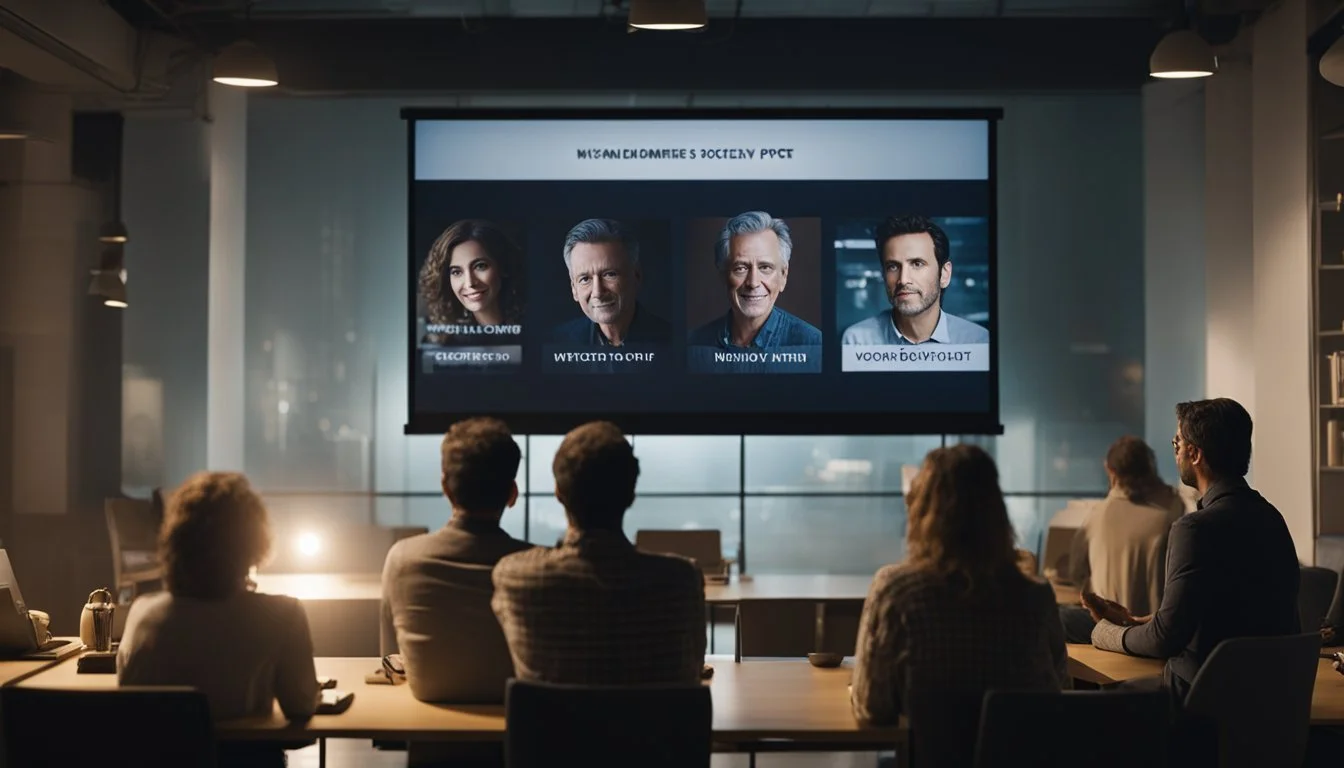5 Documentaries Exploring the Lives of Poets
Unveiling Creative Journeys
The world of poetry is as captivating as it is profound, offering glimpses into the minds and souls of some of the most eloquent and expressive individuals in history. Documentaries about poets provide a unique lens through which viewers can appreciate not just the beauty of their works, but also the personal and societal contexts that shaped their creative endeavors.
These films serve to illuminate the lives and processes of poets, revealing the inspirations and struggles behind their renowned compositions. Through the power of documentary filmmaking, audiences gain a deeper connection to the poets whose words have moved generations, exploring their journeys with both depth and authenticity.
1) Byron's Vision
"Frankenstein and the Vampyre: A Dark and Stormy Night" (2014) delves into an important moment in gothic history. The documentary, aired on BBC Two, dramatizes the famous evening in 1816 when Lord Byron, Mary Shelley, Percy Bysshe Shelley, and John Polidori gathered in Switzerland. This night led to the creation of key works in Gothic literature.
Lord Byron, a prominent figure of the Romantic era, is portrayed as fleeing from his celebrity status and financial troubles. His presence at the Villa Diodati in Geneva is depicted through dramatizations and expert commentary. The documentary explores his influence on the literature and lives of his contemporaries.
Byron's own poetic contributions and his complex, often controversial personal life are central themes. His impact on literature, coupled with his reputation as "mad, bad, and dangerous to know," is highlighted. The film provides insight into how his personality and experiences shaped his writing and lasting legacy.
This exploration of Byron's vision and influence on his literary circle offers a fascinating look at one of history's most intriguing poets.
For more information, visit IMDb.
2) Emily Dickinson: A Quiet Passion (2016)
"A Quiet Passion," directed by Terence Davies, is a biographical film about the life of American poet Emily Dickinson. Cynthia Nixon stars as the reclusive poet, delivering a strong performance that captures Dickinson's complex character. Emma Bell portrays the young Dickinson, adding depth to the poet's early years.
The film premiered at the 66th Berlin International Film Festival, garnering attention for its meticulous portrayal of Dickinson's life. It delves into her interactions with family and friends, showcasing her wit and vulnerability. Supporting actors include Jennifer Ehle, Duncan Duff, and Keith Carradine.
"A Quiet Passion" focuses on Dickinson's internal world and her poetic achievements. It emphasizes her literary significance and the challenges she faced. The screenplay weaves in some of Dickinson's most famous works, illustrating her contribution to American literature.
For more information, visit Wikipedia.
3) Neruda: The Poet’s Calling (2024)
Mark Eisner's "Neruda: The Poet’s Calling" delves into the multifaceted life of the renowned Chilean poet, Pablo Neruda. The documentary is a culmination of fifteen years of research, providing a thorough exploration.
Eisner weaves together Neruda's poetry, politics, and personal struggles. The film showcases how Neruda used his poetry for social good.
Rare footage and interviews offer viewers a deeper insight into Neruda's monumental life. With a focus on both his literary contributions and his political activism, the documentary paints a vivid picture of Neruda's world.
For more details, visit IMDB.
4) The Life of Rumi
The life of the 13th-century mystic poet Rumi is beautifully captured in the documentary "Rumi: Poet of the Heart" (1998), narrated by Debra Winger. This film provides insights into Rumi's transformation from a religious scholar to a poetic mystic, highlighting his deep spiritual experiences and relationship with Shams of Tabriz.
Rumi's poetry bridges cultural and temporal gaps, making him one of the most universally respected poets. The documentary touches on his influence and the ways in which his verses continue to inspire people globally. It explores the profound themes of love, spirituality, and the human experience that are central to Rumi’s work.
The documentary draws attention to the pivotal moment in Rumi's life in 1244, when he met Shams, whose presence ignited Rumi’s mystical poetry. Their friendship shaped much of Rumi’s literary output. This connection is a focal point in understanding Rumi’s artistic and spiritual journey.
To learn more about this documentary, visit the IMDb page.
5) Maya Angelou: And Still I Rise (2016)
"Maya Angelou: And Still I Rise" is a compelling documentary detailing the life and work of the renowned poet and author Maya Angelou. Released in 2016, this film is part of the esteemed American Masters series.
The documentary skillfully weaves together interviews, archival footage, and Angelou’s own powerful words to paint a vivid portrait of her life. It highlights her journey from a traumatic childhood in the segregated South to her rise as a celebrated literary figure.
Co-directed by Bob Hercules and Rita Coburn Whack, the film features intimate interviews with Angelou, conducted shortly before her death in 2014. These interviews offer a profound insight into her thoughts, experiences, and enduring legacy.
This documentary is notable for being the first feature-length film explicitly focused on Maya Angelou’s life. It provides a rich, comprehensive look at her contributions to literature, civil rights, and the arts.
For those interested in learning more about Maya Angelou and the impact she had on American culture, "Maya Angelou: And Still I Rise" is an essential watch. It captures her indomitable spirit and the timeless relevance of her work.
The Impact of Poetry on Society
Poetry plays a significant role in shaping society by influencing cultural norms and educational frameworks. Its ability to articulate complex emotions and social issues makes it a powerful tool for connection and learning.
Cultural Influence
Poetry has historically been a catalyst for social and political change, affecting societal norms and values. It provides a platform for marginalized voices to be heard, promoting themes of cultural diversity and immigration.
In contemporary times, poets address pressing social issues like inequality and injustice, encouraging reflection and, often, action. This type of literature serves not only as art but as a record of lived experiences and societal shifts.
Educational Importance
In the educational realm, poetry encourages critical thinking and empathy. It allows students to explore complex emotions and ideas in a relatable way, fostering a deeper understanding of linguistic and historical contexts.
Through poetry, learners engage with a broad array of cultural narratives, enhancing their comprehension and appreciation for diverse perspectives. Additionally, poetry often serves as a medium for preserving oral history, making it invaluable in educational settings aimed at enriching cultural literacy.
Documentary Filmmaking Techniques
Documentarians employ various techniques to capture the essence of their subjects. These methods often involve unique directorial approaches and distinct cinematography styles.
Directorial Approach
The way a director chooses to present a documentary greatly influences its impact. Some directors use cinéma vérité, presenting events as they happen with minimal interference. This style focuses on raw, real-life footage, providing an authentic view of the subject's life.
Others prefer a narrative-driven approach, interweaving commentary, interviews, and reenactments. This method can deliver a more structured exploration, offering insights through expert opinions and personal testimonies. Some directors take a poetic path, using abstract elements to evoke emotions and convey deeper meanings, often eschewing traditional storytelling for a more artful presentation.
Cinematography Styles
Cinematography in documentaries varies widely, depending on the director's vision. Handheld cameras are a staple in cinéma vérité, enabling close, intimate shots that add to the authenticity. This style can immerse viewers in the subject's world, offering a fly-on-the-wall perspective.
In contrast, some documentaries use static shots and carefully composed frames to create a more polished, reflective atmosphere. These films often employ high-quality studio lighting to emphasize mood and tone. Aerial footage and time-lapse photography are also popular techniques, providing sweeping, grand vistas or capturing the passage of time to highlight changes and continuity in the subject’s life.




